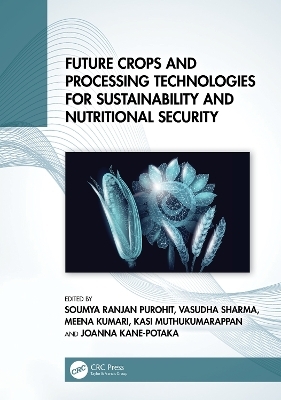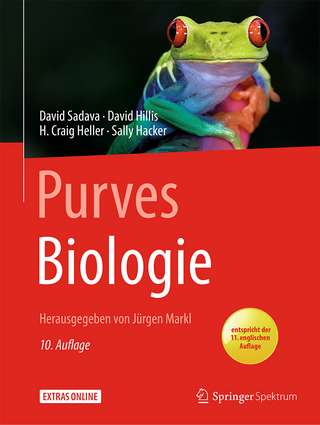
Future Crops and Processing Technologies for Sustainability and Nutritional Security
CRC Press (Verlag)
978-1-032-24800-4 (ISBN)
Our current food system faces challenges across the board – from ensuring food security and reducing environmental impact to managing costs and minimizing waste. Fortunately, cutting-edge food processing technologies play a critical role in paving the way for a more sustainable future. Taking a two-track approach, Future Crops and Processing Technologies for Sustainability and Nutritional Security presents sustainable technologies and emerging crops that are capable of ensuring nutritional security. There are various crops that are nutritious but under-utilized. Crops covered in the book are those that are climate resilient and exhibit less use of water and zero discharge to environment, such as millets and legumes like chickpea, groundnuts, and pigeon pea.
KEY FEATURES:
Provides a comprehensive literature review on the opportunities and challenges in achieving sustainability and nutritional security
Presents compatible, relevant crops to address both sustainability and nutritional security
Discusses the emerging technologies/crops/food products to justify sustainability and potential to ensure nutritional security
This book also provides information on all aspects related to the processing and use of sustainable technologies and crops. The use of technologies like 3D printing, novel drying method, high pressure processing, high-voltage treatments, and the proper combination of conventional methods are addressed.
Soumya Ranjan Purohit is Assistant Professor at Tezpur University, Assam. He has five years of Teaching and Research Experience. Dr. Purohit completed his doctoral studies at Indian Institute of Technology Kharagpur and Post-doctoral research at South Dakota State University, USA. His research interest is food bioprocessing with particular emphasis on sustainability. Vasudha Sharma is Assistant Professor in the Department of Food Technology, Jamia Hamdard, New Delhi, India. Dr. Sharma obtained her PhD in Food Process Engineering from IIT Kharagpur and has more than 10 years of teaching and applied research experience in food processing technologies. She has published widely in the areas of functional foods, non-dairy probiotics, sustainable food technologies, process optimization and nanobiosensors for food safety. Meena Kumari is working as an Assistant Professor at Amity University, Noida, Uttar Pradesh, India. Her research area is focused on bioavailability of nutrients from foods. She has done her Ph.D. from CSIR-Central food technological research institute, Mysuru, Karnataka. She had published papers in peer reviewed international SCI journals. She had also presented papers at various national and international conferences. Kasi Muthukumarappan has established himself as a global leader in research and mentoring within the food processing sector. He has obtained 65 grants, totaling over $20 million, as a Principal Investigator and co-PI. His scholarly output includes over 250 peer-reviewed publications and more than 350 regional, national, and international presentations. His international recognition stems from his pioneering work in nonthermal processing, rheological properties, and the thermo-chemical conversion of biomass. Dr. Muthukumarappan’s research encompasses fruit juices' rheological properties, coproducts' value addition, and efficient biomass conversion. Joanna Kane-Potaka is a marketing expert with global leadership in public, private sectors and with non profit organizations including four CGIAR centers - WorldFish, Bioversity, International Water Management Institute (IWMI), and most recently at International Crops Research Institute for the Semi-Arid Tropics (ICRISAT) as the Assistant Director General of External Relations. She began her career as an agricultural economist and later moved into market research in agribusiness and spent most of her career in international development.
Section A Sustainable Food Processing Technologies
Chapter 01 Sustainable Food Processing Technologies
Dibya Ranjan Dash, Niveditha Asaithambi, Sushil Kumar Sing, Poonam Singha
Chapter 02 Novel Drying Technologies
Asutosh Mohapatra, Tanya Nagpal, Nikita Sanwal, Tapasya Kumari, Manaswini Barik, Jatindra K. Sahu
Chapter 03 3D Printing of Food
Sukirti Joshi, Jatindra K Sahu, Maria Charalambides, Sangeeta Prakash, S.N. Naik
Chapter 04 Processing of Food Using Light Sources
Ajit K. Mahapatra, Hema L. Degala, Poliana M. de Souza
Chapter 05 Cold Plasma
Ramkrishna Salunke, Shalini Arya, Roji Waghmare
Chapter 06 Food Texturization
Ajay Kumar Swaranakar, Soumitra Banerjee, Rakesh Kumar Raigarh
Chapter 07 Emerging Encapsulation Techniques
Pintu Choudhry, Lavanya M. N
Chapter 08 Food Irradiation
Lata I Shukla, Albert Jonathan Bareh, Aadil Ashraf, RakshaGoswami, P Vivek Vardhan
Chapter 09 Sustainable Food Packaging
Ajit Kumar Sing, Arunima Sing, Rasika Mane, Youn Suk Lee
Section B Nutritional Security
Chapter 10 Future Staples for Nutrition Security and Sustainability
Joanna Kane-Potaka, Seetha Anitha, Stefania Grando, Parkavi Kumar, Raj Bhandari, Madhuvanti Kale
Chapter 11 Impact of Processing on Micronutrient bioavailability
Meena Kumari, Anjum Khanam
Chapter 12 Edible Flowers: Potential application for Nutritional Security
Payel Ghosh, Lavnya Devraj, Rahul Subhash Yadav
Section C Policy Regulations and Road Map for Sustainable Food System
Chapter 13 Policy for Sustainability and Nutritional Security
Swati Jain, Anu Srivastava, Miranda Hendry, Darija Kvesic, Leon Booth
Chapter 14 Future Road Map for Sustainability and Nutritional Security
Susmita Chandra
| Erscheinungsdatum | 22.08.2024 |
|---|---|
| Zusatzinfo | 41 Tables, black and white; 23 Line drawings, black and white; 22 Halftones, black and white; 45 Illustrations, black and white |
| Verlagsort | London |
| Sprache | englisch |
| Maße | 178 x 254 mm |
| Gewicht | 740 g |
| Themenwelt | Naturwissenschaften ► Biologie |
| Technik ► Lebensmitteltechnologie | |
| Technik ► Umwelttechnik / Biotechnologie | |
| Weitere Fachgebiete ► Land- / Forstwirtschaft / Fischerei | |
| ISBN-10 | 1-032-24800-9 / 1032248009 |
| ISBN-13 | 978-1-032-24800-4 / 9781032248004 |
| Zustand | Neuware |
| Informationen gemäß Produktsicherheitsverordnung (GPSR) | |
| Haben Sie eine Frage zum Produkt? |
aus dem Bereich


